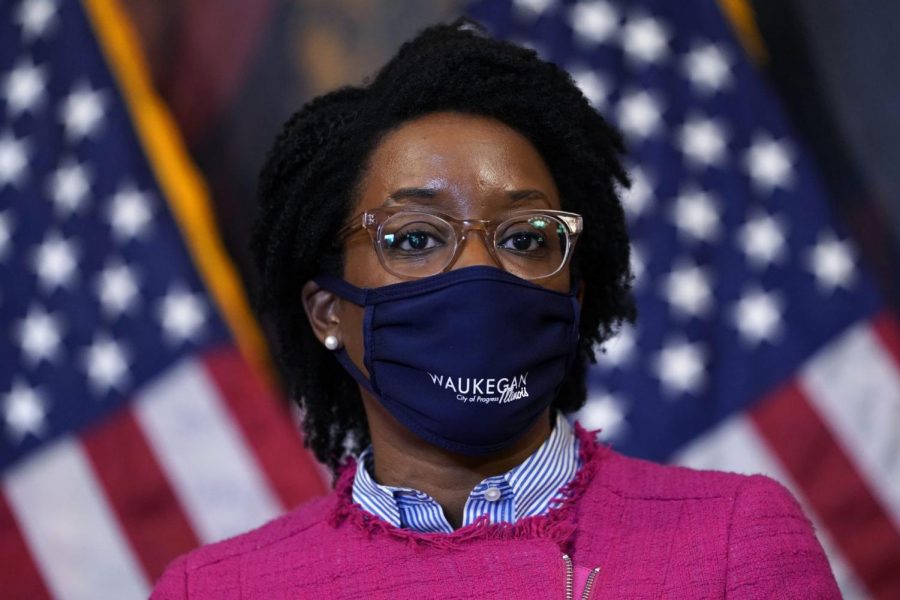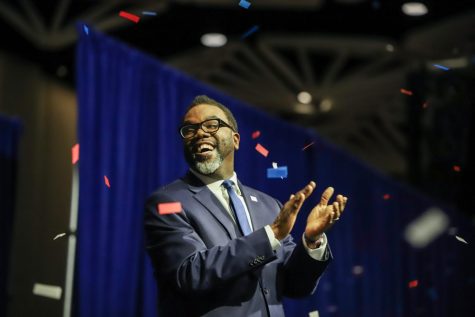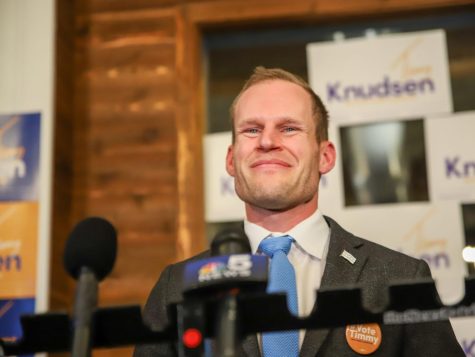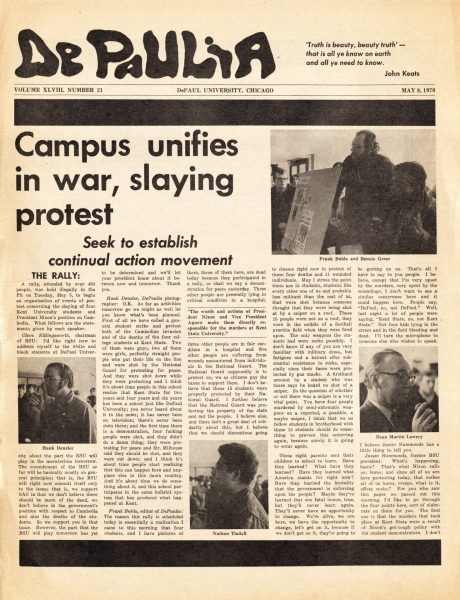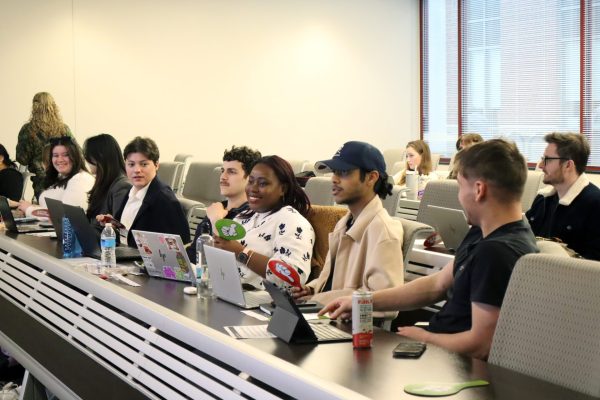Contested race for 14th Congressional district seat teeters on youth, commitment to president
Rep. Lauren Underwood, D-Ill., speaks during a news conference about COVID-19, Thursday, Sept. 17, 2020, on Capitol Hill in Washington.
NAPERVILLE, Ill. — U.S. Rep. Lauren Underwood turned the historically “red” 14th Congressional District of Illinois “purple” in 2018 and looks to keep it that way as she defends the seat against Republican Jim Oberweis in the upcoming election.
“I pledged to my constituents that I would be the most accessible, transparent and accountable Congresswoman that this community had ever seen,” Underwood said in an interview with The Chicago Sun Times. “And I’m proud of the work we’ve accomplished together so far.”
Underwood originally took the seat in response to the unhappiness of President Donald Trump’s first two years in office, despite it being one of the 30 congressional districts to vote for the president in 2016.
DePaul University adjunct faculty member Richard Craig said the move was unheard of in some areas in the district.
“Until redistricting began to bring the suburbs closer to Chicago, I know that Wheaton, next door, never voted Democrat even during the Depression,” Sautter said. “Naperville is even more affluent.”
Sautter said a similar outcome may occur in this year’s election.
“This race is likely to be determined by how well President Trump does in the Chicago suburbs,” Sautter said. “The early talk was that he had ‘lost’ Republican suburban women. That was before all the riots. They may return since Biden is not an especially strong candidate, and they may fear Harris is too far left.”
The view is shared by Oberweis as well.
“I think this election is clearly a referendum on the President,” Oberweis said in an interview with the Sun-Times.
Some locals, however, feel the state will realign with its Republican party ties regardless.
“There’s a strong possibility of Oberweis winning because the town I grew up in was very conservative,” said Cathryn Simpson, 21, Oswego. “I also worry about younger people not taking this race as seriously. I know that there are a lot of Trump supporters from my hometown regardless of his actions.”
The result of the race will likely largely depend on whichever voter base is most energized come election day.
“Generally, someone like Underwood would lose reelection two years later in a presidential year with larger turnout,” Sautter said. “This year seems different with the animus toward President Trump and the Republican suburban women’s revolt.”
The outcome of this race has the potential to send a clear message to the current administration — whether it be in support or condemnation of Trump’s time in office is still up in the air.
“At this point I don’t know how [this election] could be about anything other than Trump,” said Dawn McKinney, a registered nurse in the district.
McKinney has been an active voter in the 14th Congressional District for the past 30 years. This year, like in 2018, she is campaigning on behalf of Underwood, who is also a registered nurse and public health expert.
“I just don’t see how anyone can get behind people who are dismissing the severity of the virus,” McKinney said. “They’re still holding in-person rallies and things like that. Jim [Oberweis] had one in Naperville just last night.”
Oberweis, notably running on the same ticket as Trump, praised what the president has accomplished including his response to the Covid-19 pandemic in a joint interview with Underwood hosted by the Chicago Sun-Times editorial board.
“I think this election is clearly a referendum on the president,” Oberweis said.
He then added that the voters he’s talked to have expressed no desire to vote for Joe Biden in the general election.
Oberweis did try to maintain some distance between him and the president by repeatedly making distinctions that while he supports much of what Trump has done, he does sometimes take issue with the way in which he does things.
Underwood, by contrast, denounced the president’s response to the pandemic and emphasized that her priority was keeping her constituents safe, and therefore would continue campaigning virtually. She also reiterated her legislation record since her election which includes three bipartisan bills that were eventually signed into law by the president.
“This election is not about Donald Trump in the 14th Congressional District,” Underwood said. “I don’t believe the president shares values with our community and he’s certainly not been a role model for our children, however I have been able to work with his administration to get results for our community.”
Many kids who grew up during the Trump administration are now able to vote — and the 14th Congressional District race could come down to young voters.
Illinois State Sen. Jim Oberweis, a Republican, is out of touch with today’s issues. In his interview with the Chicago Sun-Times editorial board, he made errors regarding the postal service’s condition and consistently referred to the past, decades before a vast majority of the electorate were born.
“Some of you youngin’s might not remember,” Oberweis said during the forum. “But back in the ‘40s, milk used to be delivered to homes every day.” He referred twice more to the ‘60s, too.
His opponent, Lauren Underwood, a Democrat, is of striking contrast — young, progressive, female and Black. She understands the issues facing young people and families today, like climate change, healthcare and importantly for young people, gun violence.
“Our community has been touched by gun violence,” Underwood said. “I can’t tell you the number of families I have spoken with whose children were scared to go back to school because of the threat of gun violence and active shooter drills, and a sense of immediacy that they felt.”
Voters in the area, specifically young ones, say they find voices like Underwood’s more appealing.
“I feel like, nationally, my voice as a young person isn’t really being reflected,” said Jake Rehling, 20, a Naperville resident. Given the opportunity to have someone closer to my age, who understands my demographic and is listening to them, I’m obviously going to vote for them. It’s nice to know that if Lauren Underwood’s reelected, there’s someone speaking for us on a national scale.”
Rehling is not alone. A growing number of Generation Z and Millennials say they feel “disillusioned” with their leaders, that neither party is truly addressing their needs, The New York Times reported. Plus, it may be harder for those voters to know how to vote, since they’re just starting out.
“The problem is, many of the pieces of information on voting and voter engagement are on the secretary of state’s website and it’s not focused towards students,” Hira Khan, a coordinator for the Campus Vote Project, which is a nonpartisan group working to increase student voting, told IllinoisChannel.org. “So the terms used, students may be unfamiliar with, like absentee ballots and absentee voting. This might be the first time some of them are hearing of that kind of stuff.”
As up to 36 percent of the district’s population, according to census data, Millennial and Gen Z voters could easily swing the election in Underwood’s favor.
The difference between which candidate wins the tightly contested race could come down to whether candidates are able to tow the line between the needs of the town’s young and old constituents. Oberweis’ inability to do that might cost him the race.
“I love his ice cream, but he’s not getting my vote,” Rehling said. “Too old.”
Underwood, too, is young — notably, the youngest Black woman to serve in Congress.
According to a study conducted by Political Parity, incumbency functions as a major hindrance to women’s advancement into both Congressional races and positions. The report states that incumbents win their races at a rate of approximately 95 percent, with 90 percent of incumbents being male.
“Women are far more likely to run and to win if they are running for an open seat rather than against an incumbent,” the report reads.
Some voters think that Oberweis’ perspective as an older white man is not representative of the district’s individual voices, despite the district boasting a majority-white population of 85.8 percent.
“Personally, I don’t think any of us should continue to defer to an old white man’s judgment,” said Sydney Lobdell, a 21-year-old voter from Naperville. “Their sense of the world just isn’t accurate anymore, regardless of party.”
Lobdell admires Underwood’s more progressive approach to politics when compared to Oberweis. This gap between the candidates was highlighted in an interview with the Chicago Sun-Times, in which both candidates were asked about their thoughts on police reform.
Underwood addressed issues in policing as systemic issues to be addressed by congressional action.
“All across our country this summer, we’ve been having this open conversation about race and racism and white supremacy and Black Lives Matter and how that intersects with policing,” she said. “And so I’ve listened to our community and actually helped lead the George Floyd Justice and Policing Act to be passed through the House of Representatives.”
Oberweis appeared to attribute police violence to individual actions, while also criticizing Underwood for not condemning lootings in the city as a result of Black Lives Matter protests.
“I think that it’s pretty clear that there have been some really bad things that have happened in our country by some misguided members of the police staff in different areas of the country,” he said. “When that happens those people should be prosecuted, absolutely, there is no defense for some of the actions that have occurred, I completely agree… yet, my opponent, we’ve called on her to condemn the rioting and looting and she’s refused to do that as well, and I think that’s just fundamentally wrong.”
Lobdell expressed faith in Underwood as a candidate, expressing hope that her potential reelection will bring positive systemic change to the state.
“With more young women and POC in elected positions, I think Illinois and all other states can actually begin to dismantle the harmful systems in place,” Lobdell said. “Even if incumbent Underwood doesn’t make huge waves if reelected, the incremental movement towards a younger, progressive Congress is still important.”


